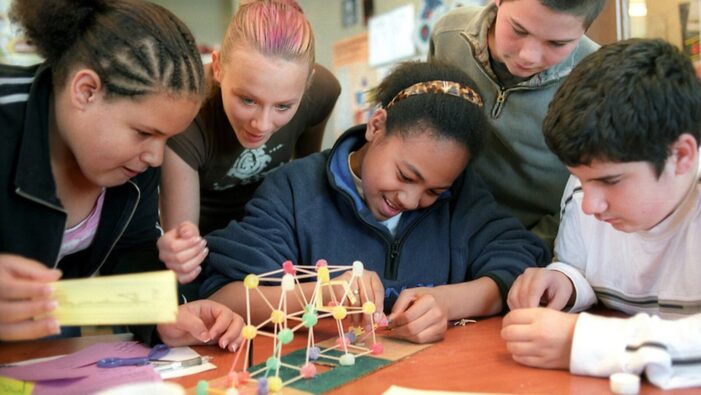My drive to improve public education, paired with my love for teaching science, is what inspired me to enter the teaching profession. I have seen that empowering students to self-advocate and resist oppression is the best way I can improve an educational system that I benefited from.”
Emily’s Story
Teaching Disciplines
Biology, Chemistry, Physics & Engineering
Why Science
“I love teaching science because I feel it is the best lens to study and better understand the world around us and our communities.”
Volunteer Experience
During her freshman year at Wesleyan University, Emily got involved with Wesleyan Science Outreach, a service and education organization that designs and implements a series of weekly, hands-on, after-school science activities for local elementary school students. Two years later, she took over running the organization. In this role, she taught a service-learning course to her peers who helped develop lessons for the science club. This experience ignited her interest in teaching as a profession. Emily also worked as an after-school science teacher at the local Boys and Girls Club and tutored English language learners at the International House while studying to earn an MAT from Brown University. While studying abroad in Ecuador, she extended her stay to teach English—and conduct science, math, and social studies lessons in English—to fourth and fifth graders at La Escuela Bilingue Los Algarrobos.
Professional Experience
During the 2014–2015 academic year, Emily taught 7th and 8th grade science at The Learning Community Charter School in Central Falls, Rhode Island. In the fall of 2015, she began teaching at Blackstone Academy Charter School, where she taught various science courses to students in grades 9-12. She transitioned to being a physics instructor when she moved in 2019 to Senn High School in Chicago, Illinois, and continued in this subject matter when she moved in 2021 to Edison High School in Alexandria, VA. In 2023, Emily transitioned into higher education, and is currently an Educational Development Specialist for the Teaching & Learning Transformation Center at University of Maryland, College Park. In this role she uses her instructional design and coaching skills to support instructors at UMD. Since beginning her career in education, Emily has found a more focused interest in confronting privilege and power in her classroom, and using education as a political act. Through the exploration of her own white privilege on her own and with her colleagues, Emily has been working to develop curriculum with a focus on social justice and engineering. She presented her curriculum at six national conferences in between 2017 and 2024: National Science Teachers Association (3 times), National Association for Multicultural Education, Free Minds Free People, American Association of Physics Teachers, Teaching For Change, and National Council for the Social Studies. As she continues on in her career, Emily hopes to learn more about how to work with her students and other instructors to confront and resist white supremacy in the current educational system.
In addition to being a Knowles Fellow, Emily was a Teach Plus Rhode Island Teaching Policy Fellow in 2017 and a 2021 Diversity Talks National Abolitionist Leaders Fellow .
Hobbies
When she isn’t teaching, Emily enjoys traveling, running, reading and cooking.
Academic Background
- Brown University (Master of Arts in Teaching, Secondary Science – Biology)
- Wesleyan University (Bachelor of Arts in Neuroscience and Behavior (Honors), and Psychology)

Engineering to Empower